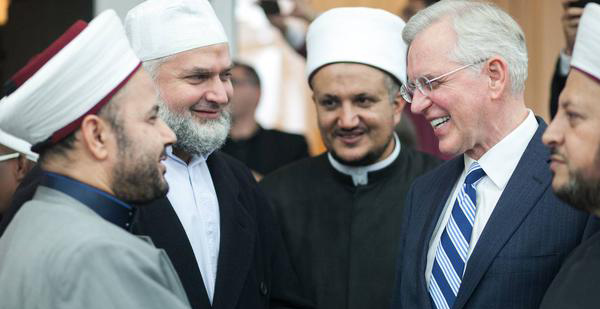Elder Christofferson Speaks on Religious Freedom at Mosque in Brazil
Contributed By Jason Swenson, LDS Church News Staff Writer

Elder D. Todd Christofferson, second from right, shakes hands with participants at a Celebration of Religious Freedom event at a mosque in Sao Paulo, Brazil. Elder Christofferson delivered a keynote address at the April 29, 2015, event.
Article Highlights
- Human rights are intrinsically tied to religious freedom.
- Religion often promotes different ideas than what is culturally popular, so religious freedom is often opposed.
“How can we enjoy freedom of the press unless we can publicly print or post who we really are?” —Elder D. Todd Christofferson of the Quorum of the Twelve Apostles
SAO PAULO, BRAZIL
“Religious freedom is the cornerstone of peace in a world with many competing philosophies,” said Elder D. Todd Christofferson.
Religious freedom “gives us all space to determine for ourselves what we think and believe—to follow the truth that God speaks to our hearts,” he said.
Elder Christofferson of the Quorum of the Twelve Apostles delivered the speech defending religious liberties at a mosque in São Paulo, Brazil. Attending were Muslims, Catholics, Adventists, Jews, Evangelicals, and native spiritualists—along with people of no faith.
He spoke days after his colleague in the Quorum of the Twelve, Elder Dallin H. Oaks, shared a similar message in Buenos Aires, Argentina.
The two speeches were not coordinated.
“But we are always on the lookout for opportunities like this. … There is great interest in this subject,” said Elder Christofferson.
The speech was one of the keynote addresses in an April 29 event dubbed “Celebration of Religious Freedom: Brazil, a Voice to the World.” It was held at Brazil’s first and largest mosque and was attended by business and religious leaders from a variety of backgrounds.

Elder D. Todd Christofferson delivers a speech on religious freedom during a nondenominational gathering at a mosque in Sao Paulo, Brazil.
In his speech, delivered in Portuguese, Elder Christofferson noted that Brazil has been recognized as the country with the lowest level of government restriction on religion. The South American nation, he said, can be a guiding light for the world.
Religious freedom allows for diverse beliefs, protects the vulnerable, and helps negotiate conflicts, he added. It serves believers and nonbelievers alike—and it’s vital in a democratic society.
Such freedom goes beyond merely being “left alone,” he said. It’s also about living one’s religion or belief in a legal, political, and social environment that is tolerant, respectful, and accommodating of diverse beliefs.
Human rights are intrinsically tied to religious freedom.
“How can we claim the freedom of speech without being able to say what we truly believe?” he asked. “How can we claim the freedom of assembly unless we can gather with others to share our ideals? How can we enjoy freedom of the press unless we can publicly print or post who we really are?”
Elder Christofferson said calls in defense of religious freedom have gained momentum over the last several decades. Practicing that freedom, he said, correlates to better family lives, less substance abuse and crime, higher education levels, longer lives, greater income, and a host of other positive benefits.
“Unfortunately, protections afforded to freedom and religion and belief are often weak, unheeded, and attacked,” he said. “Powerful pressures attempt to restrain religious freedom even as it grows—and even in countries that historically protected it most vigorously.”
The Church leader said most Western democracies claim belief in the practice of religious freedom—but its application sparks controversy. Threats arise when religious people and institutions seek or say or do something—or refuse to say or do something—that runs counter to those in power, including political majorities.
“Religion is often countercultural and thus unpopular,” he said in the speech. “For this reason, religious freedom, even when it is generally supported in principle, is often vigorously opposed in practice.”
Elder Christofferson pointed to controversies over issues such as whether churches can decide whom to hire or not hire as their ministers, whether employers must pay for employees’ contraceptives and abortions, or whether individuals can be compelled to provide services that offend their beliefs.
“The need to protect and preserve religious liberty—in a fair and balanced way that protects others’ fundamental rights—is acute,” he said.
After calling upon people of diverse beliefs to work together and defend religious freedom, Elder Christofferson concluded with a passage from Mormon scripture: “No government can exist in peace, except such laws are framed and held inviolate as will secure to each individual the free exercise of conscience” (D&C 134:2).
